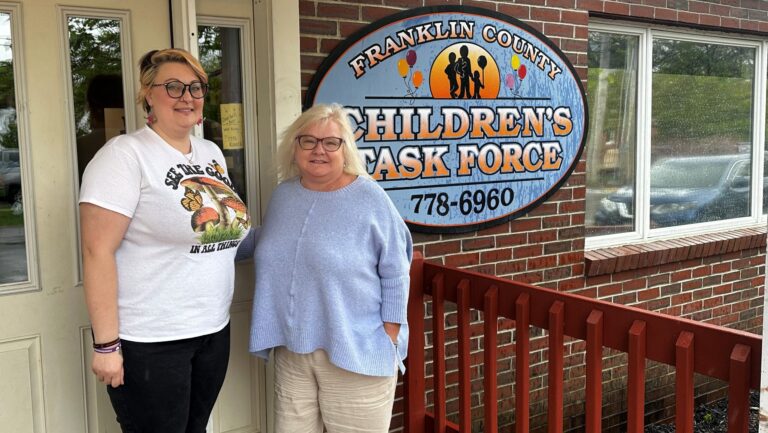MaineHealth program is using the pediatric relationship to support healthy child development and build family resiliency

In a child’s early years, regular pediatric visits are vital, not only in terms of medical care, but as a chance for medical professionals to track developmental milestones, determine whether interventions may be needed, and assess whether children are getting everything they need at home to thrive.
The pediatric relationship is especially important for families facing adversity – such as poverty, substance use disorder, or instability – whose children face a greater risk of Adverse Childhood Experiences (ACEs). With the right support, the connection to a pediatric home offers families the chance to mitigate and prevent ACEs before they have a negative effect on a child’s physical and mental health. But challenging circumstances can interfere with a family’s ability to take the necessary steps.
For the last three years, a Foundation-supported initiative at MaineHealth has used an innovative approach to strengthen the pediatric experience for families facing adversity. The Supporting Families Growing Together program promotes the healthy development of children by building the resiliency of the families around them. With continued funding from the John T. Gorman Foundation, it is now taking what it has learned over that time to expand and strengthen the program.
At the heart of the program are Early Childhood Support Specialists (ECSS) embedded within pediatric practices in Portland and Rockland. Alongside practitioners, the ECSS works with families with young children who have barriers to accessing medical care, basic necessities or who have been screened as having an increased risk of ACEs. The goal of the relationship is to provide families with what they need – education, resources, and emotional support – to foster the healthy development of their children.
The ECSS uses a collaborative approach to determine the intervention level based on a family’s level of need and goals. They provide parent education, model developmentally appropriate interactions with children, and offer tips for healthy attachment and how to deal with challenging behavior. They connect families to a range of services, including state and federal benefits and community resources. When families are in need, they help secure essentials like food, car seats, diapers, and transportation. They provide warm hand offs to referred health care providers, walk families through assessments for Child Development Services, and help families process what was shared during the pediatric visit.
But foremost, the ECSS uses a non-judgmental, trauma-informed approach to build trust with families so they feel connected to the practice, confident in their child’s care, and supported as caregivers.
“Addressing basic needs allows us to establish relationships with families,” said Annette Burns, ECSS for Pen Bay Pediatrics in Rockland. “I find that with each interaction, those relationships become stronger and we get a bigger picture of what families are needing. With the ECSS in place, they have a friendly face and non-biased ear that connects them to their medical providers and makes it a little less stressful for them to bring their children for well-child visits.”
To date, the work has reached 450 families and led to measurable, positive outcomes — including increased lead screening rates at ages 1 and 2; increased developmental screening rates by age 3; a 57% improved connection rate to Child Development Services for families referred by pediatricians; and 86% of families documenting progress on their parental goals.
An internal survey also found that medical providers overwhelmingly supported the program. Providers noted that the ECSS position helps them feel less burned out, increased their knowledge about resources for families facing adversity, improved their relationships with families, and allowed them to spend more time during visits assessing health care and development needs.
Dr. Steve DiGiovanni said this support was critical when his pediatric practice in Portland grew 50 percent in a year and a half due to an influx of families seeking asylum. “There’s just no way a lot of these families and children would have gotten care without this position,” he said. “The ECSS was assisting with transportation, obtaining diapers, connecting families to State of Maine resources to help them stabilize. It was a challenge, but there’s a lot to celebrate in the success of how many of these children and families got their immunizations, their developmental screenings, and primary care home in place.”
Importantly, an evaluation found that parents also appreciated the support of the ECSS and reported a positive impact. “It’s really been a great overall experience,” one parent responded. “I’m not sure that I would have been able to be a successful parent otherwise.”
As promising as its results have been, the team has found several areas where the approach can be strengthened over the next three years. Among other changes, it will increase the age range from 0-3 to 0-5 years to cover an important gap before children are in the school system; start working with obstetrics departments to reach families earlier, in the prenatal months; and focus supports on families with the highest level of need.
“The team at MaineHealth has done amazing work over the last three years in helping hundreds of children and families build resiliency,” said Jennifer Beck, Vice President, Programs at the John T. Gorman Foundation. “With these changes, it will have an even deeper impact. There’s much we can learn from this approach.”


